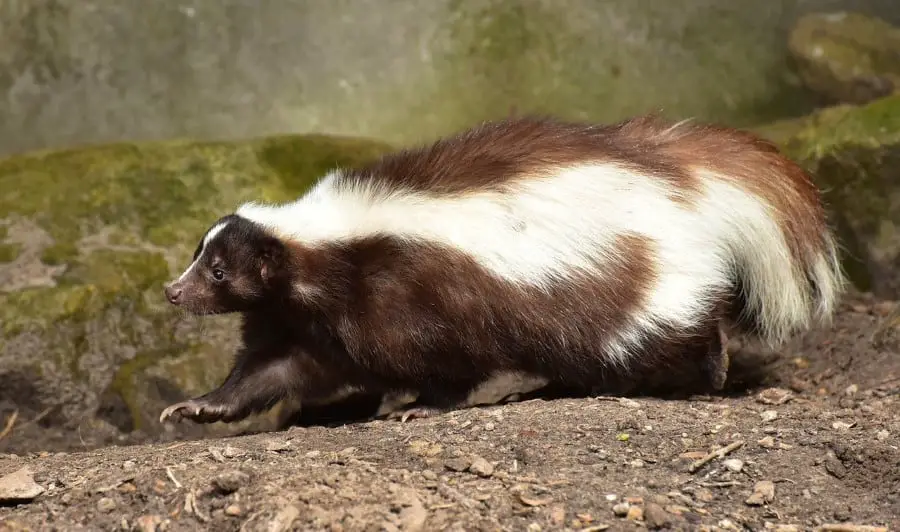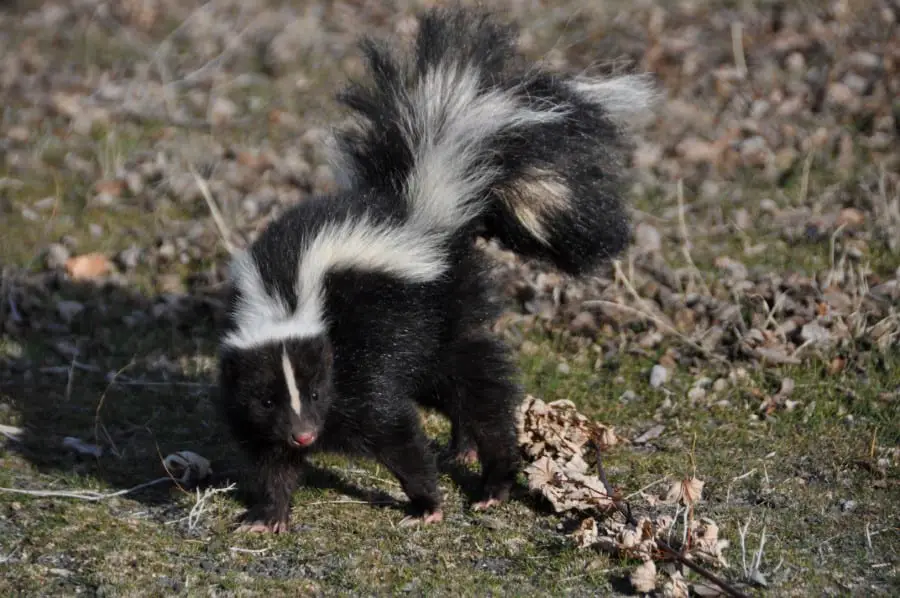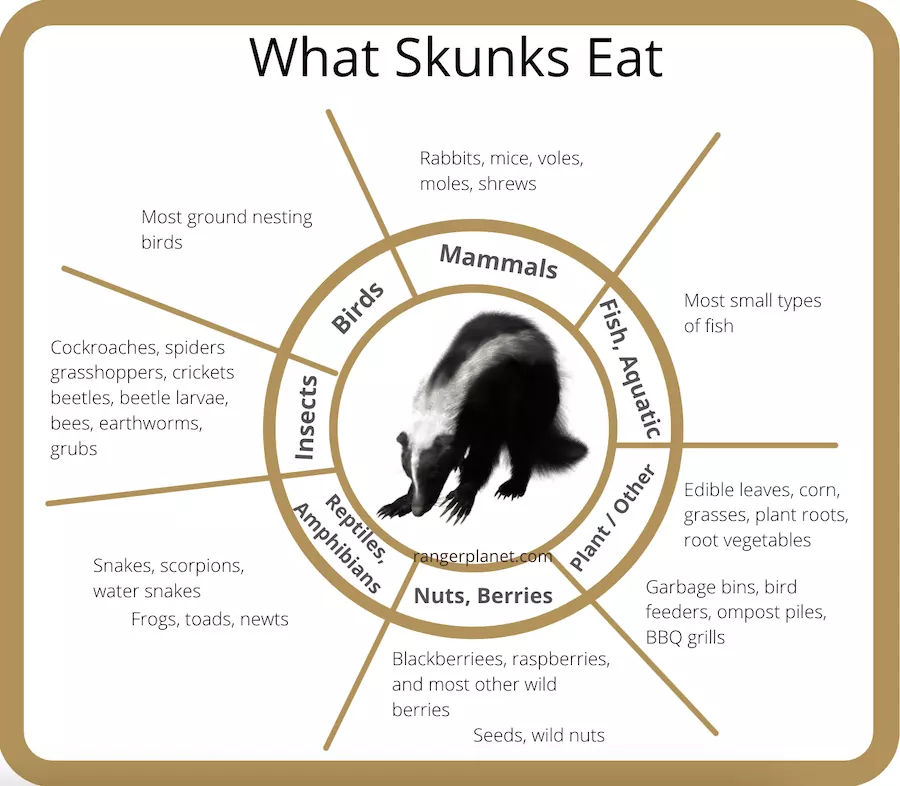Skunks are animals well-known for their intolerable skunk spray, which they use in self-defense. This article will give a detailed understanding of what skunks eat and why. The complete Skunk diet – including seasonal-specific foods.
But first, here’s a quick snapshot to takeaway, then we’ll dive into more details…
What Do Skunks Eat? Skunks are omnivores and are very adaptable in their diet. However, their favorite food consists of small prey and insects, especially in summer and spring. Plants are usually eaten when food is scarce. In Winter, when food is extremely sparse skunks may invade garbage and trash for food.
Especially during the summer months, when food is in abundance, skunks will use this time to eat lots of food to sustain both themselves and their young better through the winter months.
So now let’s take a look at what skunks eat. You can play the video below on what skunks eat, from the Ranger Planet youtube channel. Or continue reading the article.
What do skunks eat?
Before we get into the detail, we should mention that skunks – as omnivores are not overly picky animals. To some extent, they do have scavenger tendencies, so this means that their diet is very adaptable depending on seasons and availability – and is key to their survival.
And most importantly, skunks don’t have a proper mechanism to combat or attack animals and to prey on them.
Yes, they do have an effective spray for self-defense, but when it comes to their physical capacity or ability to kill animals, little is fully understood about this.
So this diminished capacity for skunks to attack many animals makes it more obvious that their diet needs to be relatively simple – and will never include prey that is too large for them to attack.
This also means that if they cannot find prey that they can kill and feed on, they will have to rely on foraging for food that they can eat to sustain themselves and their young, including plants and other edible foods.

This is in contrast to the mink which is a ferocious predator of small mammals, birds and also eats a wide variety of food. Here’s the full list of what a mink eats.
Skunks eat small prey
Although humans consider skunks as a nuisance because of their unpleasant odor, they are beneficial in many ways.
This is because skunks prey on small creatures that are harmful to gardening and a healthy lifestyle as a whole. It’s estimated that on average around 70% of a skunk’s diet is made up of insects.
As such even though skunks may seem and sound like a nuisance, they do still help in getting rid of destructive insects around the home and yard.
Many yard pests and other yard creatures and insects make up the bulk of a skunk’s diet, like:-
- Snakes
- Cockroaches
- Grasshoppers
- Crickets
- Beetles
- Beetle larvae
- Spiders – even the black widow spider
- Fish
- Scorpions
- Rabbits
- Mice
- Voles
- Moles
- Shrews
- Ground nesting birds
- Small reptiles
- Small amphibians (frogs, toads, newts)
- Water snakes
- Bees
- Other small animals.
While these may sound common prey for pretty much most of the animals, what’s interesting about a skunk’s diet is that skunks are one of the major predators of the honeybee.
Of course, protecting themselves from bee stings is possible with the thick tuft of fur on their bodies. How skunks attack the beehives is also quite interesting.
Firstly they scratch the beehives with their forefeet and long claws. This will firstly trigger the guard bees to come out and they usually are the first set of bees that get eaten up.
Some of the prey that skunks choose to eat are often to teach their young ones self-defense mechanisms. Especially when skunks target more treacherous animals like snakes and the treacherous black widow spider.
Apart from being a nutritious diet, they’re animals that teach instinctive mechanisms for attacking and self-defense to their young.
A skunks diet in winter
Skunks do not fully hibernate in winter, at times during winter when a skunk wakes from its torpor – usually, when temperatures are 30° Fahrenheit or above. They may choose to leave the comfort of their den at night to forage for food.
Where possible, skunks will forage for and eat:
- Insects
- Frogs and toads
- Birds and other eggs
- Earthworms
- Grubs
- Snakes
- Other small animals.
- Berries
- Edible leaves
- Nutritious grasses
- Plant roots
- Nuts
Find out how a Skunk prepares for winter
Skunks eat plants
As we mentioned earlier, skunks are omnivores and their diet also consists of plants. But it has to be said the plant-based diet is mostly only an alternative that skunks turn to during times when food is scarce.
Plants are also consumed by skunks when they cannot find their favorite food easily, either by a simple shortage for that year or because colder weather is beginning to set in.
It has to be said, the favored food for a skunk is mainly small creatures and those listed above. But, mostly during late fall and winter, skunks often do have to eat plants as an alternative, when available, skunks will opt to eat:-
- Corn
- Blackberriees
- Blueberries
- Other wild berries
During winter, skunks may also search for and eat:-
- Seeds
- Nuts
- Plant parts on the ground
- Plant roots
Roots and fruits of plants are one of the favorite parts of their plant-based diet as their available around ground level.
Skunks diet in urban environments
Most skunks, especially when food is not available, will also look to invade homes and feed on decaying plants and other food sources around properties, which is mainly when skunks become an annoyance for humans. So, similar to a fox’s diet, skunks will eat garbage!
Find out What Foxes Eat
Skunks eat garbage
Although this may sound unpleasant to us, skunks are omnivores and so they are very versatile and adaptable when it comes to food.
So they do feed on human garbage and trash. Especially as unattended garbage is also very welcoming to insects, rodents that skunks can also eat.
Plus leftovers and even rotting food from the garbage can could potentially make up a huge meal for skunks that are foraging for food.
Skunks deviously raid garbage and trash looking for their favorite food, which can quickly create a complete mess in backyards and entrances.
When food isn’t available in trash or garbage, this can bring more problems. This is because when skunks don’t find what they want in the garbage they can often target other food courses, such as:-
- Bird feeders
- Compost piles
- BBQ grills
This often further aggravates the problems that skunks can pose to humans.
But it’s important to remember that skunks, like rats, are animals of routine. This means that when skunks locate a steady source of food from garbage and trash cans, they may forge a habit of visiting your home more often in search of the same food source, especially during winter, when food is scarce.
Unfortunately, aside from the spray, this is largely why humans do not like skunks.

How and Why Skunks Change Their Diet
Skunks as omnivores generally prefer animals over plants. But depending on the seasons and availability of food, these can differ.
Starting with summer and spring, these are the times that skunks feed on fresh food sources as they’re available in plentiful supply.
During spring and summertime, skunks will feed on grasshoppers, bees, beetles, beetle larvae, and crickets as well as others from our first list above.
During this time, skunks naturally eat fewer plants and more prey. As winter approaches, when the availability of food reduces, skunks will eat food that is not as fresh and those that even fall to the ground and are easily accessible.
This includes fruits and crops that are left rotten or not harvested. It’s also during winter that skunks will dig in through garbage and trash more often.
Over this cold season and as a last resort, skunks may occasionally kill poultry to eat their eggs. In fact, during this season skunks will usually eat anything edible they come across if it provides sufficient nourishment.
Skunks adopt this eating pattern in winter because since they don’t fully hibernate they need to find food to help keep them active and warm and provide enough layers of fat.
Learning resources
We’ve found the ideal resources to continue your learning at home and at school on amazon. Help support our efforts for wildlife causes and keep this site working for nature. Amazon also donates to Wild-life related charities!
Beautiful photos are paired with STEM-appropriate text to offer a basic exploration of the appearance, behavior, and habitat of skunks, the musk-spraying mammals. Also included is a story from folklore explaining the unpleasant scent of skunks.
Discover the secret behaviors of a notoriously stinky mammal–the skunk–by following a family as the kits grow from infancy to adulthood.
Related articles:-
Where Do Skunks Live
Do Skunks Hibernate
To finish…
We hope this deep dive into the eating habits of skunks has helped you understand a little more about what these creatures eat. What to be careful of when leaving food out and perhaps a little more understanding of the world of skunks.

This content has been checked and verified by a qualified veterinary practitioner. The article has been reviewed by our editorial board and has been approved for publication in accordance with our editorial policy.
